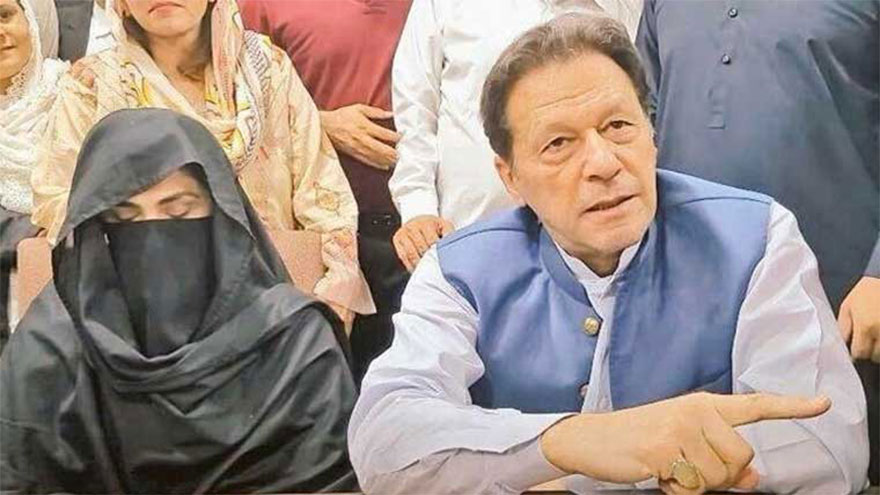Court Proceedings Reach Crucial Turning Point
Islamabad — The high-profile Toshakhana-II case against former Pakistani Prime Minister Imran Khan and his wife Bushra Bibi has entered its final phase, with the court issuing formal questionnaires to both defendants.
The case was heard by Special Judge (Central) Shahrukh Arjumand, who provided each of the accused with a 29-question document under Section 342 of the Criminal Procedure Code — a procedural step allowing defendants to explain their position before the final arguments.
According to court officials, this marks a critical stage in the proceedings as the National Accountability Bureau (NAB) investigation nears completion.
Background: What Is the Toshakhana Case?
The Toshakhana (meaning “treasure house”) controversy revolves around the alleged misuse of state gifts received by public officials. Under Pakistani law, any gift given to a public officeholder by foreign dignitaries must be reported to the Toshakhana and can only be retained after paying a specified amount.
Imran Khan, who served as Pakistan’s prime minister from 2018 to 2022, is accused of failing to properly disclose and sell valuable state gifts for personal benefit, including luxury watches, jewelry, and other high-value items.
The Toshakhana-II case — a continuation of the original inquiry — focuses on transactions allegedly involving Bushra Bibi, Khan’s wife, and how the proceeds from these items were handled.
Testimonies Completed, Cross-Examination Concluded
So far, the court has recorded statements from 20 witnesses, including NAB investigation officer Mohsin Haroon, who is regarded as a key witness. Earlier proceedings — including the cross-examination of the 20th witness held at Adiala Jail — highlighted the defense’s strategy of questioning procedural gaps and evidence handling. Defense attorney Qausain Faisal Mufti continued that line of argument during the latest hearing, challenging the prosecution’s interpretation of evidence and alleged inconsistencies in the investigation record.
Following the conclusion of witness testimonies and cross-examinations, Judge Arjumand adjourned the hearing until October 8, instructing both Imran Khan and Bushra Bibi to submit their written responses to the questionnaires on that date.
Legal Teams and Family Members Attend Hearing
During the proceedings, several prominent figures were present in the courtroom, including Imran Khan’s three sisters, senior lawyers Salman Akram Raja, Barrister Saif, Barrister Ali Zafar, Ahmad Musarrat, and Mashal Yousafzai. Their attendance underscored the case’s importance and the political attention surrounding it.
Observers noted that the defense appeared focused on highlighting alleged procedural lapses by NAB and emphasizing that Khan’s actions were consistent with previous administrative practices concerning Toshakhana items.
Next Hearing to Shape Case Outcome
The October 8 hearing is expected to play a decisive role in determining the case’s trajectory. The court will review the written responses and final arguments, which will likely pave the way for the judgment phase.
Legal analysts suggest that this stage could define the broader implications of the Toshakhana cases — not only for Khan’s political future but also for accountability mechanisms in Pakistan’s political system.
The Toshakhana investigations have already ensnared several politicians from past administrations, making it a symbol of growing judicial scrutiny over how public officials handle state gifts and privileges.
Broader Political Implications
Imran Khan, founder of the Pakistan Tehreek-e-Insaf (PTI) party, remains at the center of Pakistan’s turbulent political landscape despite facing multiple legal challenges. He has consistently denied all allegations, describing them as politically motivated attempts to sideline him ahead of upcoming elections.
Meanwhile, public debate around the Toshakhana cases reflects the deep divide between Pakistan’s governing coalition and opposition supporters. Many view the ongoing proceedings as a test of Pakistan’s judicial independence and its ability to ensure accountability for those in power.
As the court moves closer to a verdict, both local and international observers are watching closely — viewing the Toshakhana-II proceedings as a key indicator of Pakistan’s legal and political trajectory in the months ahead.















